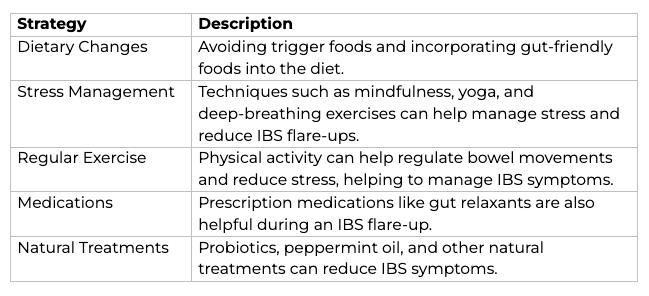Irritable Bowel Syndrome (IBS) is a widespread gastrointestinal disorder impacting the large intestine, leading to abdominal pain, altered bowel habits, and bloating. Although a cure is unavailable, managing IBS entails lifestyle changes, dietary adjustments, and symptom-controlling medications. Let's dive in and explore the strategies to combat IBS flare-ups.
The Importance of Diet in Managing IBS Flare-Ups
When it comes to managing IBS flare-ups, diet plays a significant role. For those with IBS, it is advisable to limit or avoid spicy and fried foods, dairy products, carbonated drinks, caffeine, and artificial sweeteners to help manage their condition and reduce the risk of flare-ups. Make a food diary to note down the triggers of your IBS and discuss them with your dietitian. To understand this better, check out my e-book the IBS Reset which includes a comprehensive approach to addressing IBS.
Stress Management and IBS
There is a strong connection between stress and IBS. Stress can trigger IBS symptoms and cause a flare-up too. Deep breathing, yoga, meditation, and getting therapy are all techniques that can lower stress levels, ultimately managing IBS.
Maintaining a regular sleep pattern and taking time every day for unwinding and self-care is equally essential.
Exercise and IBS
Managing IBS flare-ups can be significantly aided by regular physical activity. Exercise can help control IBS by lowering stress levels, enhancing your mood, and controlling intestinal contractions.
Exercises like cycling, swimming, and brisk walking can be a good start. At least do a moderate half-hour workout every day. Just don’t overburden yourself, as overexertion can be a triggering factor for IBS.
Medical Treatments and Therapies
When it comes to managing IBS flare-ups, medical treatments, and therapies can play a crucial role. Here’s a breakdown of managing IBS flare-ups through medications and therapies:
Medical Treatment:
- Antispasmodic drugs: These drugs can assist with easing stomach cramps and spasms by loosening up the muscles in the gut.
- Laxatives: They promote regular bowel movements by relieving constipation.
- Fiber Supplements: Adding soluble fiber can also help to regulate bowel movements.
- Low dose Antidepressants: Antidepressants have shown to reduce pain and discomfort by acting on the gut-brain axis.
Therapies:
- Cognitive Behaviour Therapy (CBT): Stress and anxiety are common triggers for IBS flare-ups. CBT helps manage these triggers by changing thought patterns and behaviors.
- Gut-Directed Hypnotherapy: A specialized form of hypnosis that aims to improve IBS symptoms by focusing on the gut-brain connection.
- Relaxation Techniques: Deep breathing, meditation, and progressive muscle relaxation can help reduce stress and promote overall well-being.
Remember that IBS cannot be treated overnight. It requires a lot of patience and time to find the perfect combination of medications and therapies that would work for you. Discuss your symptoms, medical history and preferences in detail with your doctor before starting any of these regimens. Check out my comprehensive e-book, the IBS Reset, which goes into depth on understanding both the roles of medication and natural options to addressing IBS flares.
Table: Strategies for Managing IBS Flare-Ups

FAQs
Can IBS flare-ups be prevented?
IBS as a disease is often lifelong. However, its flare-ups can be prevented by better understanding your triggers.
Is it normal for IBS symptoms to come and go?
Yes, it’s normal for IBS symptoms to come and go. IBS symptoms depend entirely on your stress level, diet, and lifestyle.
What triggers IBS flare-ups?
IBS flare-ups can be triggered by a variety of factors, including certain foods, stress, hormonal changes, certain medications, and a sedentary lifestyle.
How long do IBS flare-ups last?
Generally, IBS flare-ups last from a few hours to several days. Factors like diet, stress, and medication can all contribute to the length and severity of an episode.
References
Verywell Health. (n.d.). How to Deal With an IBS Attack. [Online]
Fody Foods. (n.d.). How to Relieve IBS Pain Fast. [Online]
Mindset Health. (n.d.). How to calm an IBS flare-up. [Online]
As always, this is not medical advice, just information regarding IBS, so check with your medical professional to review your symptoms as well as medical options that may help address your condition. Before starting any of the things mentioned above, it is best to receive an individualized approach to see what may best work with you.









